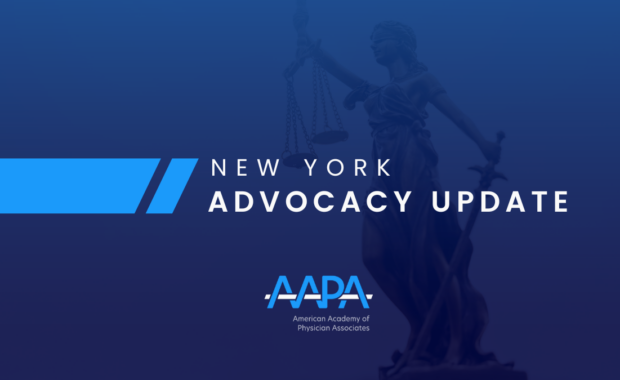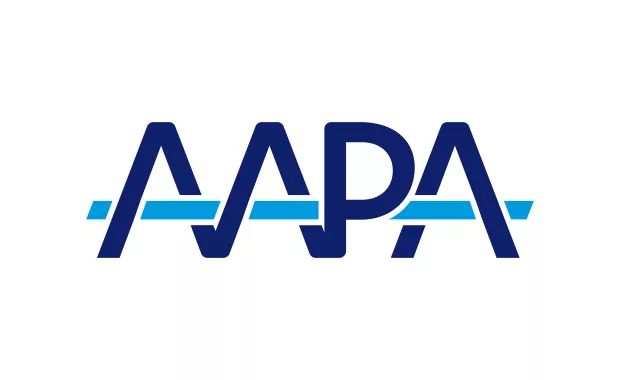When it Comes to Leadership, Gerald Kayingo Has Done it All
Executive director of PALLA is involved in research, teaching, and nurturing the next generation of PA leaders
August 26, 2024
By Jennifer Walker
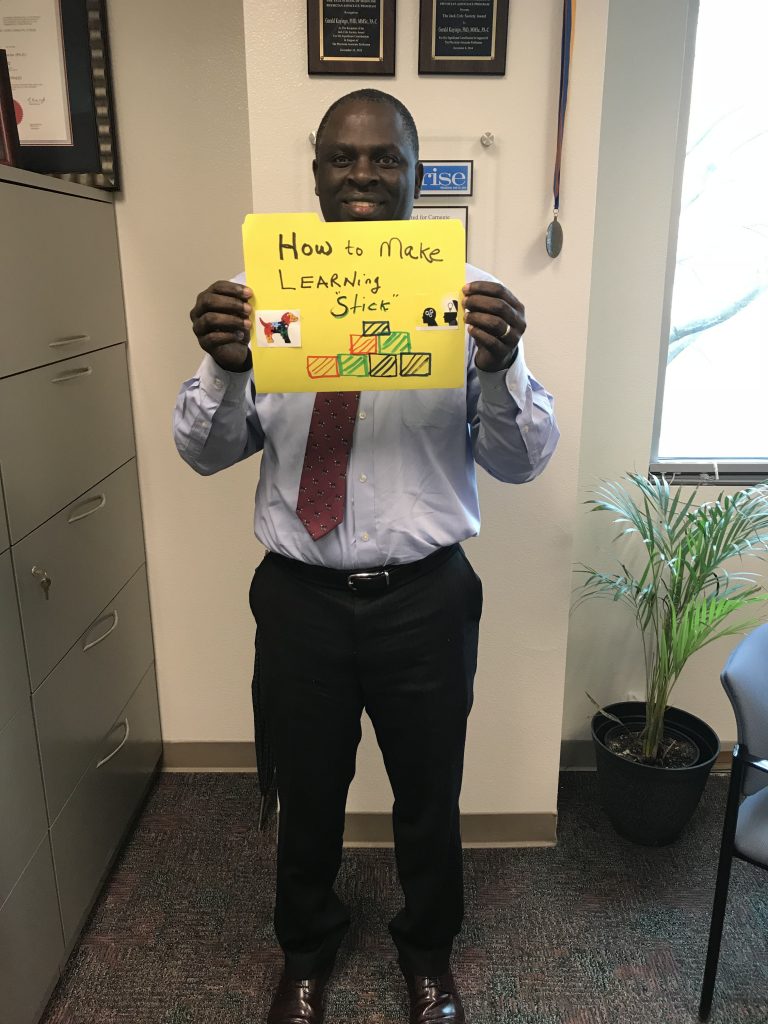
When Gerald Kayingo, PhD, MBA, PA-C, DFAAPA, became a PA in 2007, his background in science and research helped him see the field through a different lens. Kayingo quickly noticed fresh opportunities for leadership within the profession.
“One thing that stood out [to me] is that the profession was predominantly clinical,” he says. “But you need people to teach medicine. You need people who want to do research, and you need people who want to be leaders. I quickly saw that these were going to be areas for the future, and that PAs have transferable skills to do all of the above.”
Throughout his PA career, Kayingo has taken advantage of a variety of leadership opportunities, including research, teaching, and managing programs. Today, he is the executive director of The Physician Assistant Leadership and Learning Academy (PALLA) at the University of Maryland, Baltimore (UMB). PALLA’s goal is to support the advancement of PA education in Maryland and to develop the next generation of PA faculty leaders, while also advancing PA research and policy. The organization does this through the UMB PALLA Fellowship, a 10-month teaching fellowship for PAs in Maryland and the only program of its kind in the country, as well as by providing support to the state’s existing and developing PA programs.
“The role of the PA is evolving, and there are some areas that are still untapped,” says Kayingo, who is also an assistant dean for research and a professor at UMB. “The traditional idea [is] that you become a PA and all roads end in patient care. [But] PAs can see patients and still do more. The gap for leadership and for research is wide open.”
[See how PAs lead with expertise – and follow through with human connection]
A Long Road to Becoming a PA
Kayingo grew up in Uganda, Africa, where young people choose their lifelong career paths in high school. Kayingo, who is the eldest of 11 children, was interested in becoming a caregiver, specifically a physician. But after his dad passed away during his senior year, his opportunities became more limited and financial support for his education was important. Because he received a scholarship, Kayingo, who was also interested in science, went to Makerere University in Uganda to study botany and zoology.
“My career shifted away from medicine and into the biomedical sciences because that’s where I got a scholarship. But I still majored in areas that were more [focused on] disease,” says Kayingo, adding that he took courses in microbiology and physiology.
After graduation and working for a few years in entomology, a field that Kayingo says is focused on control of disease-spreading vectors in Africa, he received a scholarship from the Dutch government to study molecular biology, microbiology, immunology, and virology at both the University of Zimbabwe and Vrije Universiteit in Amsterdam. Kayingo still wasn’t involved in clinical medicine, but he was learning about how viruses affect the body, which felt like a step closer to his original goal of patient care.
During this time, Kayingo received the prestigious university book prize for academic excellence, which is awarded to the top students at the University of Zimbabwe. This distinction helped him get noticed by the University of the Free State in South Africa, which gave him a scholarship to get his PhD in microbiology. Here, Kayingo used microorganisms to study metabolic processes; cellular responses to stress; osmoregulation, the process of regulating water balance in the body; and more. His PhD work has had a profound impact on the field of microbial pathogenesis, the ability of microbes to cause infection, as well as in the area of water channels, such as those found in the kidneys.
After he received his PhD, Kayingo got a call from Yale University in New Haven, Connecticut: They were interested in his research and wanted to know if he would come to Yale as a postdoctoral associate. Kayingo had never heard of Yale, but his friends urged him to go. In the United States, he worked in the lab of Dr. Brian Wong studying infectious diseases, particularly pathogenic fungi such as candida albicans, a common opportunistic pathogen in HIV infection and other immune-compromised hosts.
He also began earning more money, meaning that finances would no longer be the main factor in his career decisions, and he saw opportunities that wouldn’t have been available to him in Africa.
“I finally saw that in America, you could go to medical school even if your first degree wasn’t in medicine,” he says. “That was the turning point. I loved science and I was very good at it. I published and read papers, and met the big names in science and [was involved in] cutting-edge research. But there still was something that was lacking, and that was how to translate the science to patient care.”
Kayingo looked into medical school first and realized that paying for it would require having a cosigner to borrow the money. Both his parents had passed away, he didn’t have any elder family members in Africa, and he didn’t know anyone in America. Getting a cosigner felt like an insurmountable challenge.
He then set out to explore other ways to become a provider. There were several PAs on his team at Yale, so he shadowed and talked with them about their careers, scope of practice, and education. He also attended open houses for the PA program at Yale, joined AAPA, and read books about PAs.
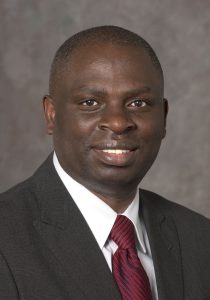
“The more I came to learn about it, the more I got excited,” says Kayingo, who ultimately attended the PA program at the Yale School of Medicine from 2005 to 2007. “For the first time, I could see all my subjects—immunology, virology, entomology, physics, microbiology—coming together. So if taking care of patients is what I needed, then this was the career for me.”
Seizing Opportunities and Growing as a PA Leader
As a new PA, Kayingo first fulfilled his long-held desire to provide direct patient care. In New Haven, Connecticut, he practiced at Cornell Scott-Hill Health Center, a federally-qualified health center where he specialized in primary care and behavioral health, and at Yale New Haven Hospital Primary Care Center.
But early on, Kayingo also jumped on opportunities for leadership. After practicing for two years at Yale New Haven Hospital, Kayingo was offered the role of clinical manager in 2013. From 2011 to 2014, he was also splitting his time between the hospital and his first faculty position as the principal faculty in the PA program at Yale School of Medicine. Here, Kayingo was responsible for coordinating the didactic curriculum, teaching courses in physical diagnosis, among other subjects, and mentoring students.
“The role of clinician educator really brought all of my strengths and assets into one bucket,” he says. “Now my abilities to read and translate papers and impart knowledge, and talk about patient care and patient cases, all came together into one single role. I felt very comfortable in the role of PA educator and started to explore opportunities for further growth.”
In 2014, Kayingo became an associate clinical professor, a founding faculty member, and later the director of the PA studies degree program at the University of California, Davis. Here, Kayingo and the team grew the PA program from a certificate to a Master’s of Health Services degree, doubled the class to 65 students, and obtained 10 years of accreditation. He also taught courses in primary care and physical diagnosis, continued to mentor students and faculty, and co-authored three textbooks, two of which have become award-winning titles at Springer Publishing.
During this time, Kayingo realized he wanted to expand his skills in strategic leadership, management, and innovation. “If I was going to be one of the people at the table making decisions, I needed to learn the language of decision making, of managing people, of strategy, of innovation. I needed to learn something about budgets,” he says. “And I wanted to go official and learn this from school.”
In 2016, Kayingo completed the Management Development Program at the Harvard Graduate School of Education, which focuses on helping participants gain skills in strategic thinking and leadership. Then, in 2021, he finished the Harvard Macy Institute’s Program for Educators in Health Professions, which teaches providers to conduct educational projects and explore leadership roles within their institutions. In 2020, Kayingo also got his MBA with a specialty in strategic leadership management from the University of Illinois, Urbana-Champaign.
To be of service to the PA profession, Kayingo has also taken on volunteer roles within AAPA. From 2014 to 2017, he was one of the pioneering members on AAPA’s Commission on the Health of the Public.
“On this commission, we identified areas of critical health needs, like healthcare disparities and diseases that we needed to focus on, and how AAPA can be in the driver’s seat in improving the health of the public,” says Kayingo, who has also served on the Board of Directors of the Physician Assistant Education Association (PAEA) and as a trustee of the PA Foundation. For example, the commission might come to a decision on whether PAs should be involved with asthma or diabetes on a national level.
Having amassed an impressive amount of leadership skills, Kayingo, who is currently a member of AAPA’s Commission on Continuing Professional Development and Education, was offered the executive director position at PALLA in 2020.
“In career planning, [PAs] have to look at their competitive advantage and in which areas they stand out,” says Kayingo, who also became an AAPA Distinguished Fellow in 2020. PALLA aims to equip PAs with these skills that will help them excel as leaders.
[Grow your network, find a mentor, and more – join or renew your membership today]
Nurturing Other PAs To Take On Leadership Roles
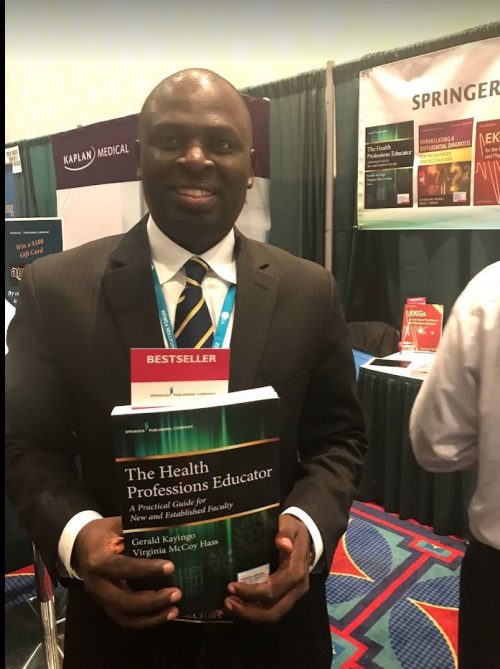
There are more than 3,000 PAs in Maryland as well as four existing PA programs and three PA programs in development. At PALLA, Kayingo, who focuses on implementing strategy, formulating policy, and managing people and programs, works closely with the state’s PA programs to ensure they’re equipped to adapt to changing needs and situations and to continually graduate top-notch PA students.
“You’re looking for clinicians who are going to be able to provide safe, quality, accessible care in the state of Maryland,” says Kayingo, whose current research is focused on health services, such as how care is delivered and organized. “Getting that done, it has to start with schools. So we need PA programs that have what it takes to create a curriculum and provide an environment that is suitable for nurturing the type of clinicians who will make a difference in communities.”
For example, during the height of COVID when PA students were no longer able to go to medical facilities for their rotations, Kayingo and the PALLA team worked with Maryland’s PA programs to set up simulation opportunities. This would allow PAs to still practice skills even though they couldn’t provide direct care to patients. Kayingo and his team have also created modules and certifications so every PA student at UMB will graduate with the skills needed to provide care through telemedicine.
Then, through the UMB PALLA Fellowship, PALLA is also preparing the next generation of PA faculty leaders. This 10-month fellowship offers professional development training to six fellows per year—all PAs who practice in Maryland—so they can become PA faculty members. PALLA also provides its fellows with a $20,000 scholarship to offset their clinical time and to support conference travel and other expenses, and places them in academic positions after they complete the program.
“As the executive director, that’s my job: to ensure a pipeline of faculty that will then impart knowledge in PA programs,” Kayingo says. For Maryland PAs, applications for the next fellowship cycle are due on April 14, 2022, and the fellowship will begin on September 8, 2022.
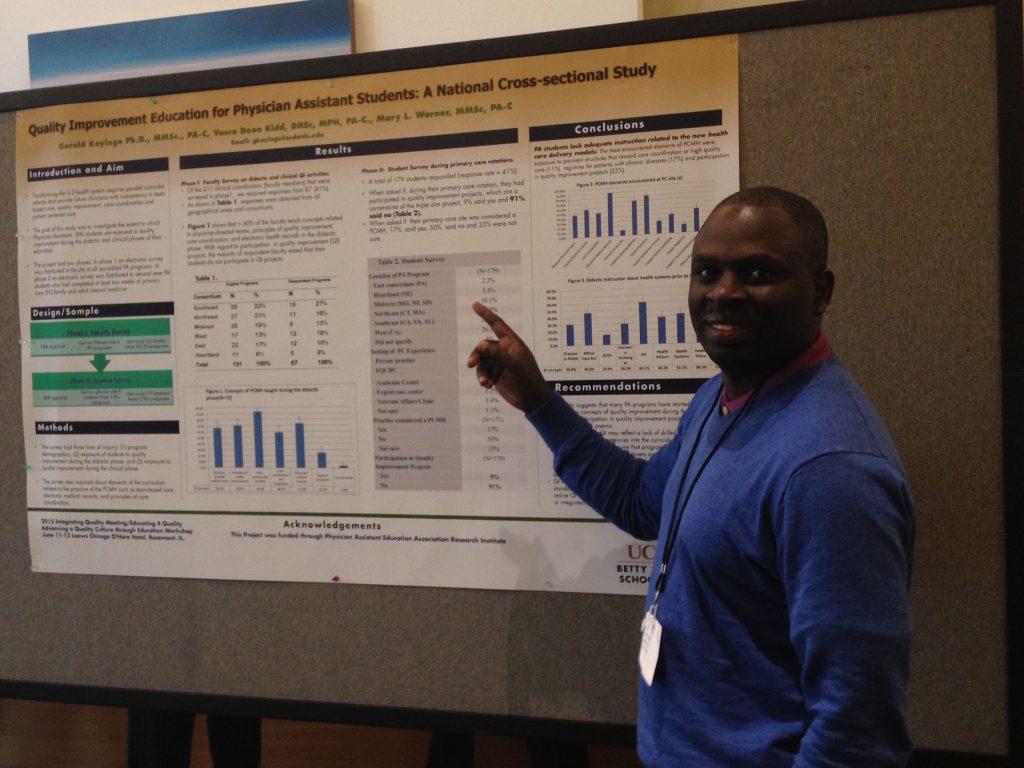
For PAs who are looking to expand into leadership roles by becoming faculty members, deans, and healthcare executives, Kayingo urges them to look for mentors both inside and outside of the profession and to explore educational programs outside of healthcare.
“Mentoring can be from other sources, from people who look at the world differently and can share opportunities that you don’t see,” says Kayingo, who in his free time enjoys reading, mentoring others, and listening to music and enjoying sports with his wife and three children. “[Also] credentials do matter. They are like keys: [They] are necessary to get into certain places. A PA who is interested in going beyond patient care is going to have to think about certain credentials that are needed for some of these unique opportunities.”
Looking back on his PA career, Kayingo says there have been challenges, starting in the beginning when he attended a PA program in a new country. He had to adjust to a new educational system and navigate visa requirements. Throughout the years, he has also had to overcome challenges related to diversity, with only 2.5% percent of practicing PAs identifying as Black or African American. Kayingo credits his former classmates, colleagues, and mentors for helping him overcome these challenges.
“Surrounding yourself with mentors and a network of diverse colleagues is very important,” he says. “I am so thankful for all of those who have supported me along the way and for the opportunities this country has afforded me.”
Jennifer Walker is a freelance writer in Baltimore, MD. Contact Jennifer at [email protected].
Editor’s Note: This article was originally published in February 2022.
You Might Also Like
Early Career PAs Share Leadership Advice
3 Ways PAs Can Advance Their Careers Through Leadership
How To Find Your Voice at the Leadership Table
Executive Leadership Conference on Demand 2021
Thank you for reading AAPA’s News Central
You have 2 articles left this month. Create a free account to read more stories, or become a member for more access to exclusive benefits! Already have an account? Log in.

